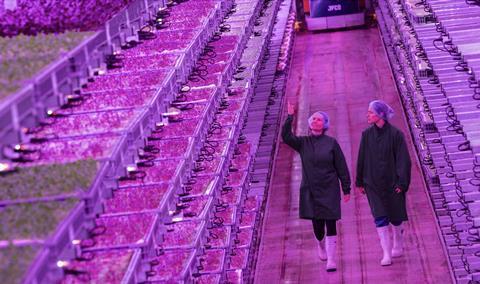“The world’s most advanced vertical farm” opens this week in Gloucestershire, growing different herbs and salad leaves
UK-based Jones Food Company (JFC) has opened its second vertical farm, JFC2, located near Lydney in Gloucestershire.

The company opened JFC1 in Lincolnshire in 2018 and a dedicated vertical farming innovation centre in Bristol in 2022.
According to the group, JFC2 utilises 100 per cent renewably-sourced energy to grow crops vertically.
These products include basil, coriander, flat-leaf parsley, dill, green lettuce, red lettuce, baby leaf pak choi, bulls blood, mizuna, komatsuna (commonly known as Japanese spinach), and baby leaf cress.
“This farm represents a coming-of-age for agricultural technology in the UK; we have now cracked the code for accessible, sustainable, premium food being grown all-year round, at a super-competitive price,” said founder and CEO James Lloyd-Jones. ”Commercial success in this sector has always been the challenge, but this farm smashes it.
“There is a place for small urban vertical farms, but size, scale and affordability are how the vertical farming revolution really delivers.
”Technology and sustainability, when married at this kind of scale, revolutionise food production, combat climate change, ensure food security, address labour issues and maximise efficiency,” he noted. “It’s a win-win-win-win.
“JFC2 leverages the UK’s world-renowned tech know-how, passion for plants and desire to reduce import dependence to radically evolve how we grow consistently high-quality, well-priced food at scale,” Lloyd-Jones continued.
”By balancing automation and smart investments, we are ideally suited to work with the distribution networks of the large retailers, ensuring product is available for all.”
JFC head of growing Glyn Stephens explained that a lot of vertical farmers had focused on lights – but temperature and humidity control were where the real ”energy guzzle” had traditionally been.
“This is why it’s been a core focus for us opening this new site, its small changes and learnings from JFC1 that mean this system now accounts for a much smaller proportion of our energy usage.
“Irrigation is another massive innovation in this farm and the system in JFC2 is boundary-pushing, ground-breaking, utterly unique and another key brick in how we deliver premium product, at a great price, at scale,” Stephens outlined.
“These aren’t small steps, they are giant leaps which allow us to put ‘vertical farming and profitability’ into the same sentence for the first time.”
The company said that JFC2’s output now included supplying own-label herbs as well as the company’s own Homegrown range of mixed salad bags and Lēaf, its range of sauces and salad bags.
“At Ocado Group, we are passionate about the long-term potential of vertical farming for both the food industry and for the environment,” said Ocado’s Stephen Daintith.
”JFC’s second vertical farm, JFC2, is an important strategic investment for Ocado and represents a significant step forward in this exciting and transformational space.
”We are confident in JFC’s leadership and on their ability to execute on their vision – we look forward to supporting them on the way ahead,” he added.



